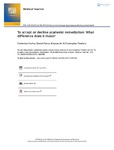To accept or decline academic remediation: What difference does it make?
| dc.contributor.author | Coelho, Catherine | |
| dc.contributor.author | Zahra, Daniel | |
| dc.contributor.author | Ali, Kamran | |
| dc.contributor.author | Tredwin, Christopher | |
| dc.date.accessioned | 2019-05-13T08:30:04Z | |
| dc.date.available | 2019-05-13T08:30:04Z | |
| dc.date.issued | 2019 | |
| dc.identifier.issn | 0142-159X | |
| dc.identifier.issn | 1466-187X | |
| dc.identifier.other | 0 | |
| dc.identifier.uri | http://hdl.handle.net/10026.1/13840 | |
| dc.description | PMID: 30942639 | |
| dc.description.abstract |
AbstractIntroduction: Academic remediation offered after failure in a knowledge-based progress-test assessment is voluntary and involves student-centered individualized support that helps students to learn most effectively for themselves. This paper explores whether accepting or declining the offer of academic remediation given to struggling students impacts their outcomes both short-term and longitudinally.Method: Data was collated from 2015–16, 2016–17, and 2017–18 and included all students offered academic remediation in the third, fourth, and fifth years of a five-year Dentistry program. Z-scores for each stage and test were calculated and centered on a triggering point; the point at which the offer of remediation was made. These students’ average performance post-trigger test and longitudinal performance were analyzed.Results: While performance for both groups significantly improved for the immediate post-trigger test after academic remediation, those that accepted remediation sustained longitudinal improvements across subsequent tests compared to those that declined remediation.Discussion: Through the academic remediation support process students appear to increase their mastery of “learning to learn” and are able to implement sustainable effective learning strategies to carry with them throughout their program.Conclusion: Students who accept academic remediation maintain a more successful academic profile compared to those that do not take advantage of this. | |
| dc.format.extent | 1-6 | |
| dc.format.medium | Print-Electronic | |
| dc.language | en | |
| dc.language.iso | en | |
| dc.publisher | Taylor & Francis | |
| dc.rights | Attribution-NonCommercial-NoDerivatives 4.0 International | |
| dc.rights | Attribution-NonCommercial-NoDerivatives 4.0 International | |
| dc.rights | Attribution-NonCommercial-NoDerivatives 4.0 International | |
| dc.rights | Attribution-NonCommercial-NoDerivatives 4.0 International | |
| dc.rights | Attribution-NonCommercial-NoDerivatives 4.0 International | |
| dc.rights | Attribution-NonCommercial-NoDerivatives 4.0 International | |
| dc.rights | Attribution-NonCommercial-NoDerivatives 4.0 International | |
| dc.rights | Attribution-NonCommercial-NoDerivatives 4.0 International | |
| dc.rights | Attribution-NonCommercial-NoDerivatives 4.0 International | |
| dc.rights | Attribution-NonCommercial-NoDerivatives 4.0 International | |
| dc.rights | Attribution-NonCommercial-NoDerivatives 4.0 International | |
| dc.rights.uri | http://creativecommons.org/licenses/by-nc-nd/4.0/ | |
| dc.rights.uri | http://creativecommons.org/licenses/by-nc-nd/4.0/ | |
| dc.rights.uri | http://creativecommons.org/licenses/by-nc-nd/4.0/ | |
| dc.rights.uri | http://creativecommons.org/licenses/by-nc-nd/4.0/ | |
| dc.rights.uri | http://creativecommons.org/licenses/by-nc-nd/4.0/ | |
| dc.rights.uri | http://creativecommons.org/licenses/by-nc-nd/4.0/ | |
| dc.rights.uri | http://creativecommons.org/licenses/by-nc-nd/4.0/ | |
| dc.rights.uri | http://creativecommons.org/licenses/by-nc-nd/4.0/ | |
| dc.rights.uri | http://creativecommons.org/licenses/by-nc-nd/4.0/ | |
| dc.rights.uri | http://creativecommons.org/licenses/by-nc-nd/4.0/ | |
| dc.rights.uri | http://creativecommons.org/licenses/by-nc-nd/4.0/ | |
| dc.subject | Academic Success | |
| dc.subject | Education, Dental | |
| dc.subject | Female | |
| dc.subject | Humans | |
| dc.subject | Learning | |
| dc.subject | Male | |
| dc.subject | Remedial Teaching | |
| dc.title | To accept or decline academic remediation: What difference does it make? | |
| dc.type | journal-article | |
| dc.type | article | |
| plymouth.author-url | https://www.webofscience.com/api/gateway?GWVersion=2&SrcApp=PARTNER_APP&SrcAuth=LinksAMR&KeyUT=WOS:000478103600013&DestLinkType=FullRecord&DestApp=ALL_WOS&UsrCustomerID=11bb513d99f797142bcfeffcc58ea008 | |
| plymouth.issue | 7 | |
| plymouth.volume | 0 | |
| plymouth.publisher-url | https://doi.org/10.1080/0142159X.2019.1585789 | |
| plymouth.publication-status | Published | |
| plymouth.journal | Medical Teacher | |
| dc.identifier.doi | 10.1080/0142159X.2019.1585789 | |
| plymouth.organisational-group | /Plymouth | |
| plymouth.organisational-group | /Plymouth/Faculty of Health | |
| plymouth.organisational-group | /Plymouth/Faculty of Health/Peninsula Dental School | |
| plymouth.organisational-group | /Plymouth/Faculty of Health/Peninsula Medical School | |
| plymouth.organisational-group | /Plymouth/REF 2021 Researchers by UoA | |
| plymouth.organisational-group | /Plymouth/REF 2021 Researchers by UoA/UoA03 Allied Health Professions, Dentistry, Nursing and Pharmacy | |
| plymouth.organisational-group | /Plymouth/Research Groups | |
| plymouth.organisational-group | /Plymouth/Research Groups/Plymouth Institute of Health and Care Research (PIHR) | |
| plymouth.organisational-group | /Plymouth/Users by role | |
| plymouth.organisational-group | /Plymouth/Users by role/Academics | |
| dc.publisher.place | England | |
| dc.identifier.eissn | 1466-187X | |
| dc.rights.embargoperiod | Not known | |
| rioxxterms.versionofrecord | 10.1080/0142159X.2019.1585789 | |
| rioxxterms.licenseref.uri | http://creativecommons.org/licenses/by-nc-nd/4.0/ | |
| rioxxterms.type | Journal Article/Review |



